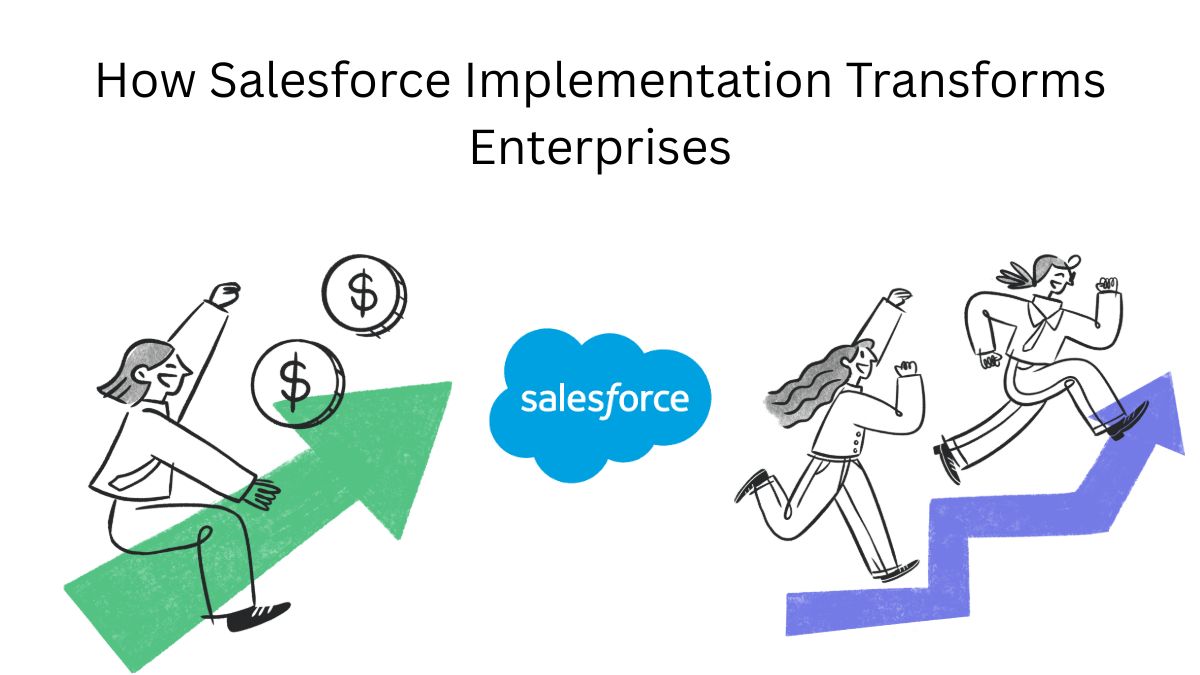Growth in an enterprise isn’t simply about increasing revenue—it’s about scaling systems, streamlining operations, and enhancing customer engagement. At the center of this transformation lies a strategic approach to digital tools that not only manage current business processes but also prepare the organization for future demands. Salesforce, as a cloud-based Customer Relationship Management (CRM) platform, offers exactly that. When implemented effectively, Salesforce doesn’t just serve as a CRM—it becomes a growth engine for the entire enterprise.
Salesforce implementation is not a one-time setup. It’s a multifaceted process that touches virtually every department, from sales and marketing to service, operations, and beyond. The transformative potential of Salesforce lies in how it centralizes data, automates workflows, enhances visibility across departments, and empowers strategic decision-making. But to unlock this potential, enterprises must approach Salesforce implementation with clarity, structure, and expert guidance.
The Strategic Significance of Salesforce in Enterprise Growth
Growth-focused enterprises often face challenges such as data fragmentation, inconsistent customer experiences, inefficient sales pipelines, and poor forecasting. These issues usually stem from legacy systems or a lack of centralized customer information. Salesforce solves these problems through its unified platform that aligns data, teams, and processes.
With Salesforce, enterprises can:
- Centralize customer data from multiple sources into a single, actionable view.
- Automate sales processes to reduce manual intervention and improve conversion rates.
- Enable real-time reporting and dashboards for faster and more informed decisions.
- Customize workflows and apps to match unique business requirements.
- Scale operations effortlessly through modular cloud solutions—Sales Cloud, Service Cloud, Marketing Cloud, and more.
These capabilities lay the foundation for long-term, scalable growth by enhancing organizational agility and aligning teams with business goals.
Understanding the Salesforce Implementation Process
Salesforce implementation is not just about installing software; it’s about aligning the platform with the organization’s structure, strategy, and goals. A well-orchestrated implementation follows a structured methodology that typically includes:
1. Discovery and Planning
Before anything is configured, a deep assessment is conducted to understand the organization’s goals, existing systems, pain points, and workflows. This phase defines the scope, priorities, and success metrics for the implementation.
2. Design and Architecture
Once business requirements are captured, the system architecture is designed. This involves mapping out data models, user roles, custom objects, and integrations. The objective is to ensure Salesforce aligns with the unique operational flow of the enterprise.
3. Configuration and Customization
Salesforce’s flexible architecture allows for both out-of-the-box configuration and tailored customization. Whether it’s custom fields, process automation, or third-party integrations, this phase shapes Salesforce into a solution that fits the enterprise like a glove.
4. Data Migration
Migrating existing data from legacy systems to Salesforce requires careful planning to ensure data integrity and consistency. This often involves cleaning, mapping, validating, and testing the data before going live.
5. Testing and Quality Assurance
Before deployment, the platform undergoes rigorous testing to identify and fix any issues. User Acceptance Testing (UAT) ensures the system meets business needs and is intuitive for users.
6. Training and Change Management
Training is critical to adoption. End users are educated on how to use the platform effectively. Meanwhile, leadership focuses on change management strategies to ensure cultural alignment and buy-in.
7. Deployment and Post-Go-Live Support
Finally, the platform is deployed, and ongoing support begins. Regular monitoring, feedback loops, and enhancements ensure the platform evolves with business needs.
The Role of a Salesforce Implementation Consultant
Given the complexity and impact of Salesforce implementation, having a Salesforce Implementation Consultant involved is often the difference between success and failure. This professional plays a central role in guiding the organization through every phase of the project—translating business needs into system capabilities, ensuring best practices are followed, and avoiding costly missteps.
A Salesforce Implementation Consultant wears many hats:
- Business Analyst: They dig into business processes to uncover inefficiencies, bottlenecks, and unmet needs that Salesforce can address.
- Solution Architect: They design a Salesforce environment that reflects the organization’s goals, ensuring scalability, performance, and usability.
- Project Manager: They keep the implementation on schedule, within scope, and aligned with stakeholder expectations.
- Trainer and Change Agent: They help teams adopt Salesforce with confidence and enthusiasm through structured training and support.
Importantly, the consultant acts as a bridge between technical implementation teams and business leaders, ensuring that the technology doesn’t just function—but serves strategic growth objectives.
Avoiding Common Implementation Pitfalls
Not every Salesforce implementation leads to transformation. Many organizations stumble due to a lack of planning, inadequate training, or over-customization. Some of the most common pitfalls include:
- Focusing on features over strategy: Implementing Salesforce tools without a clear business goal often leads to unused capabilities and poor ROI.
- Neglecting user experience: A system that’s too complex or unintuitive will face resistance, regardless of how powerful it is.
- Insufficient training: Users who don’t understand the platform will revert to old habits or create workarounds that compromise data quality.
- Ignoring post-implementation optimization: Business needs evolve, and so should your Salesforce setup.
Working with an experienced Salesforce Implementation Consultant helps navigate these challenges by ensuring each phase of the project is executed with foresight and alignment to business goals.
Driving Growth Through Data, Automation, and Insights
Once implemented, Salesforce becomes more than a system of record—it becomes a system of engagement and intelligence.
Data-Driven Decisions
Salesforce brings disparate data into one ecosystem, empowering leaders with dashboards and real-time analytics. Sales trends, customer behavior, marketing performance, and support metrics can all be monitored with precision, enabling proactive decisions that fuel growth.
Automation of Repetitive Tasks
Automation features—like workflows, approval processes, and AI-based recommendations—free teams from repetitive administrative tasks, allowing them to focus on strategic initiatives. This increases productivity and reduces operational costs.
Enhanced Collaboration
With Salesforce’s shared dashboards, Chatter (internal communication), and cross-departmental visibility, teams no longer work in silos. This alignment leads to more cohesive customer experiences and operational efficiencies.
Scalability and Flexibility
As the business evolves, so does the Salesforce ecosystem. Enterprises can expand their use of Salesforce by integrating additional modules or third-party tools, customizing reports, or building applications with the Salesforce Platform.
The Long-Term View: Continual Optimization
Salesforce is not static. To keep up with evolving business requirements, enterprises must treat Salesforce implementation as a living, iterative process. Continuous optimization—adding new workflows, refining automation, or leveraging new Salesforce features—ensures that the platform continues to drive value over time.
A good Salesforce Implementation Consultant supports this long-term vision by helping organizations transition from implementation to optimization. They ensure that Salesforce becomes not just a tool, but an asset that evolves alongside the enterprise.
Conclusion
Salesforce implementation is a pivotal step in the journey of enterprise growth. It is not just about software deployment; it’s about transforming how a business operates, engages with customers, and scales its strategy. By centralizing data, automating processes, and providing actionable insights, Salesforce creates a foundation for sustainable growth.
Yet, the path to success is rarely linear. It requires clear planning, cross-functional collaboration, and, critically, the expertise of a Salesforce Implementation Consultant who can align the platform with strategic objectives.
Enterprises that embrace Salesforce thoughtfully—guided by experienced consultants and driven by clear business goals—don’t just improve operations. They power their growth from the inside out.



